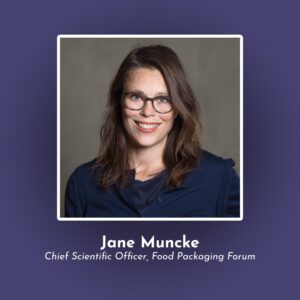
Ep 154 | Jane Muncke
Jane Muncke: “Shutting Off The Plastic Tap: A Global Treaty To Regulate Petrochemical Pollution?”
Show Summary
One of the central ecological challenges of our time is addressing the plastic and petrochemical pollution that has exploded over the past several decades. This global issue will require the cooperation of all nations. But based on the disintegration of UN negotiations for a treaty on plastic pollution last Sunday, this is easier said than done.
In this special episode, Nate is joined by toxicologist Jane Muncke, who provides an in-depth analysis following the final day of discussions in Busan, South Korea. Together, they explore the complex intergovernmental negotiations that have defined the treaty process, as well as the environmental and health policies that have shaped these conversations in recent years.
Will we ever be able to place chemical safety and public health above economic motivations at the global level? Could increased public awareness of the way these seemingly convenient products affect our health and well-being finally shut off the plastic tap? Finally, is it possible for the treaty to go beyond waste management and recycling, to instead move towards reducing the production and consumption of plastics at the source?
About Jane Muncke
Jane Muncke holds a doctorate degree in environmental toxicology and a MSc in environmental science from the ETH Zurich. Since 2012 she has been working as Managing Director and Chief Scientific Officer at the charitable Food Packaging Forum Foundation (FPF) in Zurich, Switzerland. FPF is a research and science communication organization focusing on chemicals in all types of food contact materials.
Jane Muncke is a full scientific member of the Society of Toxicology (SOT), the Society for Environmental Chemistry and Toxicology (SETAC), the American Chemical Society (ACS) and the Endocrine Society. Since 2019, she has been an elected expert member of the Swiss Organic Farming Association Bio Suisse’s committee on trade and processing where she contributes to further developing the standards for processing and packaging of organic food. She is a director of the FAN initiative, a collective of experts warning about resource overshoot, the polycrisis, and related societal collapse.
In French, we have a motto that says that a simple drawing is often better than a long explanation. Jean-Marc Jancovici Carbone 4 President
That’s very understandable because with left atmosphere thinking, one of the problems is that you see everything as a series of problems that must have solutions. Iain McGilchrist Neuroscientist and Philosopher
We can’t have hundreds and hundreds of real relationships that are healthy because that requires time and effort and full attention and awareness of being in real relationship and conversation with the other human. Nate Hagens Director of ISEOF
This is the crux of the whole problem. Individual parts of nature are more valuable than the biocomplexity of nature. Thomas Crowther Founder Restor
Show Notes & Links to Learn More
Download transcript00:00 – Jane Muncke info + works, prior TGS Episode
00:23 – Shanna Swan + TGS Episode, Martin Scheringer + TGS Episode, Sian Sutherland + TGS Episode, Jeremy Grantham + TGS Episode
01:05 – Plastic pollution treaty negotiations adjourned in South Korea
03:37 – UN Global Plastics Treaty + more info
05:12 – Resolution passed by UNEA in March 2022
06:50 – Plastics in our blood + our brain
07:03 – Decline in sperm count + testosterone levels
07:08 – The impact of EDCs on wildlife
08:35 – High Ambition Coalition (HAC) + HAC’s most recent joint statement
09:15 – The direct relationship between plastic production and pollution + the need to urgently reduce Primary Plastic Polymers (PPPs)
09:59 – Polymers and plastics explained
11:07 – What’s in a barrel of oil?
13:24 – Global distribution of plastic production + plastic waste
13:35 – Statement on behalf of the ‘like-minded group’
17:27 – Plastics used in agricultural production + impacts on soil plastic contamination
18:27 – The Polymer Premium proposal
19:21 – Leo Trasande
19:43 – Study on the health costs of plastics in the US
20:54 – State of the science on plastic chemicals report + more info
25:50 – Scientists’ Coalition for an Effective Plastics Treaty
27:02 – Juliet Kabera
32:14 – Thomas Homer-Dixon
32:57 – 1969 ‘doubt is our product’ memo + the legacy of manufactured doubt
35:32 – Chemicals in our food from plastic packaging
35:57 – Health effects of plastic pollution
36:33 – Toxic pollutants from plastic waste incineration + improper burning of plastics around the world, global macroplastic emission pollution inventory + health impacts of emissions from plastic incineration
37:12 – Soil intoxication in Lausanne
41:41 – Fast-moving consumer goods
45:12 – Commanding Hope







